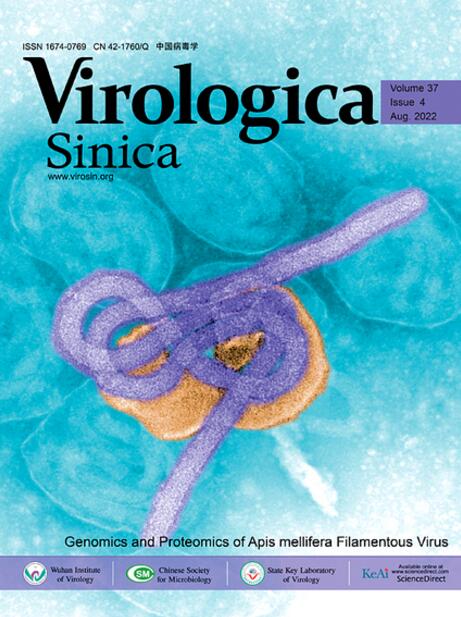Mpox 病毒独特的免疫规避机制及其对开发新型疫苗和免疫疗法的影响。
IF 4
3区 医学
Q1 Medicine
引用次数: 0
摘要
痘疹是一种由痘病毒(MPXV)引起的人畜共患传染性疾病,MPXV 属于正痘病毒属。自 2022 年以来,MPXV 已对全球公共卫生构成重大威胁。西半球出现的数千例病例促使世界卫生组织宣布进入紧急状态。痘病毒与人类广泛的共同进化史使这些病毒发展出了对抗人类免疫系统的复杂机制。具体来说,MPXV 采用了独特的免疫逃避策略来对抗各种免疫元素,这给治疗带来了巨大挑战,尤其是在普通人群停止常规天花疫苗接种之后。在这篇综述中,我们首先讨论了天花病毒的进入和早期感染的发生,然后介绍了天花病毒逃避先天性和适应性免疫反应的机制。两种 caspase-1 抑制蛋白和一种 PKR 逃逸相关蛋白已被确定为在 mpox 病毒感染期间参与调节免疫环境的系统基因组中心。在适应性免疫方面,mpox 病毒表现出独特的T细胞抑制能力,从而全面重塑了宿主的免疫环境。病毒包膜也给抗体和补体系统的中和作用带来了挑战。MPXV 所采用的独特免疫逃避机制使新型多表位疫苗和基于核酸的疫苗成为极具潜力的研究方向,值得我们深入研究。最后,我们简要讨论了 MPXV 感染对免疫抑制患者的影响以及 MPXV 疫苗的研发现状。本综述可为开发新的 mpox 免疫疗法提供有价值的信息。本文章由计算机程序翻译,如有差异,请以英文原文为准。
The unique immune evasion mechanisms of the mpox virus and their implication for developing new vaccines and immunotherapies
Mpox is an infectious and contagious zoonotic disease caused by the mpox virus (MPXV), which belongs to the genus Orthopoxvirus. Since 2022, MPXV has posed a significant threat to global public health. The emergence of thousands of cases across the Western Hemisphere prompted the World Health Organization to declare an emergency. The extensive coevolutionary history of poxviruses with humans has enabled these viruses to develop sophisticated mechanisms to counter the human immune system. Specifically, MPXV employs unique immune evasion strategies against a wide range of immunological elements, presenting a considerable challenge for treatment, especially following the discontinuation of routine smallpox vaccination among the general population. In this review, we start by discussing the entry of the mpox virus and the onset of early infection, followed by an introduction to the mechanisms by which the mpox virus can evade the innate and adaptive immune responses. Two caspase-1 inhibitory proteins and a PKR escape-related protein have been identified as phylogenomic hubs involved in modulating the immune environment during the MPXV infection. With respect to adaptive immunity, mpox viruses exhibit unique and exceptional T-cell inhibition capabilities, thereby comprehensively remodeling the host immune environment. The viral envelope also poses challenges for the neutralizing effects of antibodies and the complement system. The unique immune evasion mechanisms employed by MPXV make novel multi-epitope and nucleic acid-based vaccines highly promising research directions worth investigating. Finally, we briefly discuss the impact of MPXV infection on immunosuppressed patients and the current status of MPXV vaccine development. This review may provide valuable information for the development of new immunological treatments for mpox.
求助全文
通过发布文献求助,成功后即可免费获取论文全文。
去求助
来源期刊

Virologica Sinica
Biochemistry, Genetics and Molecular Biology-Molecular Medicine
CiteScore
7.70
自引率
1.80%
发文量
3149
期刊介绍:
Virologica Sinica is an international journal which aims at presenting the cutting-edge research on viruses all over the world. The journal publishes peer-reviewed original research articles, reviews, and letters to the editor, to encompass the latest developments in all branches of virology, including research on animal, plant and microbe viruses. The journal welcomes articles on virus discovery and characterization, viral epidemiology, viral pathogenesis, virus-host interaction, vaccine development, antiviral agents and therapies, and virus related bio-techniques. Virologica Sinica, the official journal of Chinese Society for Microbiology, will serve as a platform for the communication and exchange of academic information and ideas in an international context.
Electronic ISSN: 1995-820X; Print ISSN: 1674-0769
 求助内容:
求助内容: 应助结果提醒方式:
应助结果提醒方式:


